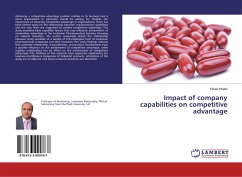
Creating a competitive advantage for small nations through branding

PAYBACK Punkte
0 °P sammeln!
Master's Thesis from the year 2011 in the subject Business economics - Offline Marketing and Online Marketing, grade: A, University of Auckland, language: English, abstract: This study addresses the research question; to what extent can nation branding create a competitive advantage for small nations? The concept of nation branding had its origins in the post-Cold War realities of a global neo-liberal economy, occurring as a spin-off from commercial brand management practices. For a small nation, the pressures of risk entailed in foreign exchange and trade transactions, cultural and political ...
Master's Thesis from the year 2011 in the subject Business economics - Offline Marketing and Online Marketing, grade: A, University of Auckland, language: English, abstract: This study addresses the research question; to what extent can nation branding create a competitive advantage for small nations? The concept of nation branding had its origins in the post-Cold War realities of a global neo-liberal economy, occurring as a spin-off from commercial brand management practices. For a small nation, the pressures of risk entailed in foreign exchange and trade transactions, cultural and political vulnerabilities are beyond the capacity of many to control, therefore nation branding which is promoted as giving a competitive advantage to nations, is an attractive consideration. This study examines and discusses the practice and study of nation branding and the possibility of imposing strategic management framework upon what had been largely a marketing-communications led concept. From the literature the characteristics of ineffective nation branding and the ethical considerations entailed in addressing a nation as a 'product' are reviewed. Implications for the stakeholders - the citizens and residents of a nation, and policymakers seeking a competitive advantage for their small nation are also reviewed. Cases of intentional small nation branding in Eastern Europe and New Zealand are compared to a case on Finland, where competitive advantage was achieved, but not through deliberate branding processes. The study proposes that reputational capital, based on realistic propositions, rather than imagery be used as a measure for development of any small nation brand. This would be created through establishing large-scale industry clusters, facilitated by social media as a networking tool for firms within the cluster. These clusters would therefore interact with the public and private sectors as well as society at large and form the units of a nation brand. Clusters serve to attract investment, technology, resources and talent and by operating in a collaborative effort towards a common strategic imperative. Competitive advantage is achieved through a set of differentiating propositions rather than singular themes relating to one overarching brand idea. This study contributes a factored framework, integrating extant models from the literature, based on creating reputational capital through development and management of clusters as units of the small nation brand and concludes with suggestions of future research.













